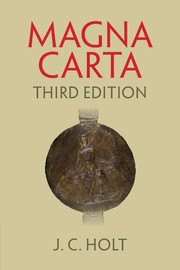Book contents
- Frontmatter
- Dedication
- Contents
- List of plates
- Preface to third edition
- Preface to second edition
- Preface to first edition
- Acknowledgements
- Abbreviations
- Introduction
- 1 The Charter and its history
- 2 Government and society in the twelfth century
- 3 Privilege and liberties
- 4 Custom and law
- 5 Justice and jurisdiction
- 6 Crisis and civil war
- 7 Quasi Pax
- 8 The quality of the Great Charter
- 9 The achievement of 1215
- 10 From distraint to war
- 11 The re-issues and the beginning of the myth
- Appendices
- References
- Index
- Plate section
Preface to first edition
Published online by Cambridge University Press: 05 July 2015
- Frontmatter
- Dedication
- Contents
- List of plates
- Preface to third edition
- Preface to second edition
- Preface to first edition
- Acknowledgements
- Abbreviations
- Introduction
- 1 The Charter and its history
- 2 Government and society in the twelfth century
- 3 Privilege and liberties
- 4 Custom and law
- 5 Justice and jurisdiction
- 6 Crisis and civil war
- 7 Quasi Pax
- 8 The quality of the Great Charter
- 9 The achievement of 1215
- 10 From distraint to war
- 11 The re-issues and the beginning of the myth
- Appendices
- References
- Index
- Plate section
Summary
The seven hundred and fiftieth anniversary of Magna Carta is not the sole reason for the publication of this book. The last comprehensive study of the Charter was McKechnie's, published in 1905 and revised in 1914. Since McKechnie wrote, much work has been done, both in studying the Charter and in publishing the records of the Exchequer and the Curia Regis which are essential to its proper comprehension. One object of this present book, therefore, is to provide an up-to-date study of the subject. But it does not follow the pattern of the previous work. The commentary to which McKechnie devoted nearly three hundred pages is no longer practicable. Furthermore, it embodied the approach of the lawyer concerned with pursuing the provisions of the Charter through subsequent legal developments. The result was a learned work of scholarship, but it was not always closely related to the circumstances in which the Charter was produced. For example, McKechnie allotted more space to cap. 36 of the Charter which concerned the relatively trivial matter of the writ of life and limb, than to caps. 52, 53 and 55 which provided for the restoration of property to those disseised by the Crown. These last clauses were among the most crucial issues between King John and his baronial opponents. Their execution led England into civil war.
The approach of the present work is different from McKechnie's, for it is the work of a historian not a lawyer. Its object is to present the Charter in a context of the politics, administration and political thought of England and Europe in the twelfth and thirteenth centuries. I have discussed some aspects of the Charter's later history in the first and last chapters, but the book is mainly about the Charter of 1215 and its immediate re-issues, for its later history cannot be understood without a proper grasp of its origins and contemporary significance.
- Type
- Chapter
- Information
- Magna Carta , pp. xvi - xviiPublisher: Cambridge University PressPrint publication year: 2015



